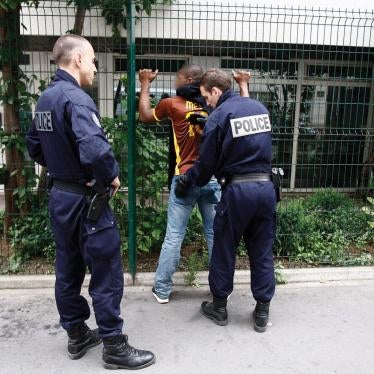Prime Minister Jean-Marc Ayrault’s recent endorsement of stop forms for police identity checks is an important step. While community groups have hailed the announcement, police unions have objected to what they describe as a precipitous and unfair measure that will impede their work. In reality, momentum has been building for some time toward reform of the identity check procedure in France. Overly broad police powers to stop people without reasonable suspicion of wrongdoing have led to abuse and fuelled resentment, particularly among minority youth. The time is ripe for reform that will both improve police-community relations and ensure effective policing.
The idea behind stop forms is simple: the police officer has an obligation to explain, on the spot and in a written document, the reason for an identity check, and the person stopped has the right to proof of the procedure. It’s a way to improve both police efficiency -- having to justify the identity check means more judicious use of the measure, and police accountability -- anyone stopped knows how and why the police are using identity check powers, and has a record that facilitates lodging a complaint if they feel their rights were violated. It’s a good idea, and already implemented in other countries to good effect.
Concerns that stop forms will prevent the police from doing their job are unfounded. In fact, the experience in Spain, Hungary, the United Kingdom, and the United States shows that that the use of stop forms can help cut down on arbitrary, unfounded stops and increases the hit rate—the percentage of stops leading to an actual law enforcement outcome, such as a fine or an arrest. Simply put, when the police are required to articulate clearly the grounds for a stop, the actual stops become both more justified and more efficient at uncovering or preventing illegal behavior.
Police contend that the stop form proposal casts undue suspicion on law enforcement. Yet there are genuine concerns about ethnic profiling and abusive practices during identity checks. Statistical and anecdotal evidence suggest that the police make decisions about whom to stop based on appearance, including race and ethnicity, rather than on an individual’s actual behavior. The experience of being stopped repeatedly or being singled out of crowds reinforces the sense among minority youth that they are being targeted because of who they are, not what they are doing.
Disrespectful and humiliating treatment during identity checks is also a problem. The dozens of adolescents and young adults I interviewed in Paris, Lille and Lyon were as likely to complain about the way they were treated as about being stopped in the first place. Many find the systematic use of the informal you by the police insulting. Interior Minister Manuel Valls rightly reminded officers recently that they should use the formal form of address.
And while a straightforward stop should usually last only a few minutes and involve little more than providing one’s identity card or other proof of identity upon demand by a police officer, minority youth are regularly subjected to lengthy questioning, orders to empty pockets, bag searches, and intrusive body pat-downs. Children as young as 13 described having to put their hands against a wall or a car, their legs splayed wide, to be patted down.
Abusive identity checks clearly damage police-community relations, which in the long run cripples the ability of the police to detect and prevent crime. Tense relations with the communities in which they work heighten an already stressful job for police officers, damaging their working conditions and morale, and sometimes increasing the likelihood they will be put in harm’s way.
This is why stop forms should be part of a range of measures to combat abusive identity checks. Right now the police have overly broad powers to stop people -- even in the absence of any evidence or indication of unlawful behaviour. This gives the police too much discretion and paves the way for abuse. The law should make it clear that all identity checks must be based on a reasonable suspicion of wrongdoing linked to actual behavior.
Police should only conduct pat-downs when they have a concrete reason to suspect the person is carrying a dangerous or illegal object. And specific rules should be adopted for pat-downs when children – anyone under 18 – are involved. Together with clear guidance, proper training and an obligation to record the legal basis for an identity check on the written stop form, this reform would help reduce arbitrary stops that fuel resentment and waste valuable police resources.
Concrete steps to curtail abuse would make a genuine difference in people’s daily lives. Stop forms are an important part of the equation. Constructive dialogue with the police and starting with a pilot project in a particular city may be necessary to build consensus. But it should be clear to everyone that bridging the gap between French police and minority youth requires a comprehensive approach.
Judith Sunderland is senior Western Europe researcher at Human Rights Watch. She is the author of the January 2012 report:“The Root of Humiliation: Abusive Identity Checks in France.”







